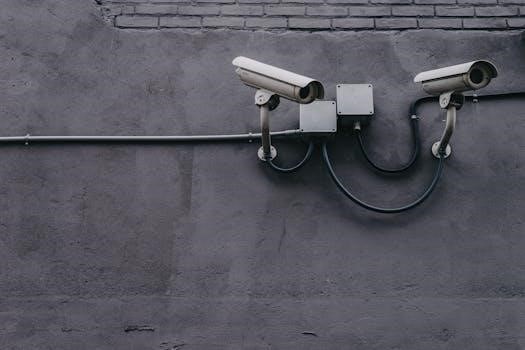Criminology is a multidisciplinary field that explores the complex nature of crime, delving into its causes, effects, and societal responses. It combines insights from psychology, sociology, law, and other fields to understand criminal behavior. Criminology also examines the workings of the criminal justice system. It seeks to prevent crime through research and analysis.
Defining Criminology⁚ A Multidisciplinary Approach
Criminology, at its core, is not confined to a single discipline; rather, it’s a rich tapestry woven from various academic threads. It draws heavily from sociology, examining how societal structures and inequalities contribute to crime. Psychological perspectives are crucial in understanding the individual factors that drive criminal behavior, exploring motivations, personality traits, and cognitive processes. Legal studies provide the framework of laws, regulations, and judicial systems within which crime occurs and is addressed. Furthermore, criminology often incorporates insights from economics, political science, and even biology, recognizing that crime is a multifaceted phenomenon influenced by a wide range of factors. This multidisciplinary approach allows for a more comprehensive understanding, moving beyond simplistic explanations and embracing the complexities of crime and its impact on society. Criminologists often collaborate with professionals from various fields, including law enforcement, social work, and policy-making, to address crime effectively. This collaborative spirit is a hallmark of the field.
The Scope of Criminology⁚ From Causes to Prevention
The scope of criminology extends far beyond just identifying criminal acts; it’s a comprehensive field that seeks to understand the entire spectrum of crime-related phenomena. It begins with investigating the root causes of crime, exploring why individuals engage in criminal behavior, and examining the societal conditions that contribute to its occurrence. This includes analyzing social, economic, psychological, and biological factors that might play a role. Criminology also delves into the patterns and trends of crime, studying how crime rates vary across different demographics and geographic locations. Furthermore, it examines the impact of crime on victims and the community as a whole, considering the social, emotional, and economic consequences. Ultimately, criminology’s goal is to develop effective prevention strategies and policies that reduce crime rates and improve public safety, aiming not only to understand crime but also to actively address it. This involves exploring various approaches, such as community-based programs, rehabilitation efforts, and targeted interventions.

Key Areas of Study in Criminology
Criminology encompasses diverse areas, including theories of criminal behavior, the criminal justice system, and crime pattern analysis. These key areas provide a comprehensive understanding of crime and its control.
Criminal Behavior Theories⁚ Psychological, Social, and Biological Factors
Understanding criminal behavior requires exploring various theories. Psychological theories delve into individual factors, such as personality disorders and cognitive processes, that may contribute to criminal acts. Social theories examine external influences, including poverty, inequality, and community disorganization, that can shape criminal tendencies. Biological theories explore genetic predispositions and neurological factors that might increase an individual’s risk of engaging in criminal behavior. These theories are not mutually exclusive; indeed, many scholars argue that a combination of psychological, social, and biological factors often contributes to the complex phenomenon of crime. Furthermore, the interactions between these factors are important to consider when attempting to understand why individuals commit crimes. Criminology uses these theories to study crime and develop effective prevention and intervention strategies. Examining the interplay of these factors helps in creating targeted approaches to reduce criminal activity;
The Criminal Justice System⁚ An Overview
The criminal justice system is a complex network of institutions and processes designed to maintain social order and address criminal behavior. It typically includes law enforcement agencies, which investigate crimes and apprehend suspects. The courts are responsible for adjudicating cases, determining guilt or innocence, and imposing sentences. Corrections facilities, such as prisons and probation services, are responsible for managing offenders. This system aims to ensure accountability for those who break the law and provide mechanisms for rehabilitation, and deter further criminal acts. The effectiveness of the criminal justice system is constantly evaluated and scrutinized in order to ensure fairness and justice. Its goals are to protect society by reducing crime, but also to uphold the rights of those accused. The system interacts with criminology by providing data and research opportunities.
Crime Patterns and Analysis
Analyzing crime patterns is a critical aspect of criminology, involving the examination of data to identify trends, hot spots, and other significant aspects. This analysis often uses statistical methods to explore the frequency and distribution of different types of crimes. Factors like time, location, and demographics are considered to better understand these patterns. Criminologists use these insights to develop effective crime prevention strategies. This information helps to allocate resources efficiently, targeting areas that need the most attention. Crime pattern analysis also helps in understanding how crime changes over time, allowing for adjustments in law enforcement and policy. By studying patterns, it is possible to uncover underlying social factors that contribute to crime. This information is essential for both immediate responses and long-term strategies.

Criminology in Practice
Criminology’s practical applications are vast, spanning various sectors, from law enforcement to policy-making. It informs strategies for crime prevention and rehabilitation, shaping real-world responses to criminal activity. This field plays a vital role in ensuring a safer society.
Career Paths in Criminology⁚ Opportunities and Outlook
A criminology degree opens doors to diverse career paths, extending beyond traditional law enforcement roles. Graduates can find opportunities as crime analysts, using data to identify patterns and trends, informing strategies for crime prevention. The field also includes positions as probation officers, working directly with offenders, and forensic psychologists, applying psychological principles to legal contexts. Furthermore, criminologists contribute to policy development, shaping legislation and social interventions aimed at reducing crime. Research positions are also available, allowing individuals to delve into the complexities of criminal behavior and societal responses to it. Opportunities exist within government agencies, non-profit organizations, and academic institutions. The demand for skilled professionals in criminology remains steady, with a positive outlook for the future. This indicates a robust job market with various options for individuals interested in making a positive impact on society. These careers offer opportunities for intellectual stimulation, community engagement, and a chance to contribute to a more equitable system.
The Role of Criminology in Law Enforcement and Policy
Criminology plays a vital role in shaping both law enforcement practices and public policy related to crime. Criminological research informs law enforcement by providing data-driven insights into crime patterns, offender behavior, and the effectiveness of various policing strategies. This knowledge allows law enforcement agencies to implement evidence-based practices, optimizing resource allocation and improving community relations. In policy-making, criminological theories and findings are crucial for developing strategies to prevent crime and rehabilitate offenders. Criminologists analyze the social, economic, and psychological factors contributing to crime, which guides the creation of effective intervention programs. Moreover, criminology helps policymakers evaluate the consequences of existing policies, identifying areas for improvement and adjustments. By bridging the gap between academic research and practical application, criminology ensures that law enforcement and policies are grounded in empirical evidence and contribute to a more just and safer society. This relationship between criminology, law enforcement, and policy is essential for promoting positive social change.

Resources for Criminology Students
Criminology students have access to a wide array of resources, including essential literature, online databases, study guides, and support materials, to aid in their academic journey. These tools are crucial for in-depth research.
Essential Literature and Online Resources
For criminology students, a wealth of essential literature and online resources are available to support their studies. Key academic journals, such as those published by Oxford University Press and SAGE, offer access to cutting-edge research and scholarly articles. Online databases, including library resources, provide extensive collections of books, articles, and reference materials spanning various subfields of criminology. These resources delve into criminal behavior theories, the criminal justice system, and crime patterns. Furthermore, specialized guides and bibliographies, such as the Oxford Bibliographies in Criminology, are invaluable for navigating the vast amount of available information. Students should also explore university websites and dedicated criminology portals for additional support and research materials. Utilizing these resources will enhance comprehension of the complex nature of crime and justice.
Study Guides and Support Materials
Criminology students can benefit greatly from a variety of study guides and support materials designed to enhance their understanding of the subject. These resources often summarize key concepts, theories, and research findings, providing a concise overview of complex topics. Many guides offer practice questions and exam preparation tips to help students consolidate their knowledge. Additionally, online forums and study groups can foster collaborative learning and peer support. Furthermore, some institutions provide subject-specific crib sheets and revision guides that serve as quick reference tools. These support materials can also include glossaries of criminological terms, helping students navigate the discipline’s unique vocabulary. Utilizing these guides and support materials can greatly improve comprehension and academic performance in criminology.

Contemporary Issues in Criminology
Criminology today grapples with evolving crime trends, such as cybercrime and terrorism; Debates surround effective policing strategies, rehabilitation, and the impact of social inequalities. Research focuses on emerging theories and policy implications.
Current Debates and Research Areas
Contemporary criminology is characterized by dynamic debates and extensive research across various critical areas. A significant area of discussion revolves around the effectiveness of different crime prevention strategies, including community policing, restorative justice, and the use of technology in law enforcement. Researchers are actively examining the impact of socioeconomic factors, such as poverty and inequality, on criminal behavior. The role of mental health and substance abuse in contributing to crime is another key focus. Furthermore, there are ongoing debates about the ethical considerations of criminal justice practices, such as surveillance and sentencing. The influence of social media and the internet on crime patterns, including cybercrime and online radicalization, also present complex challenges. Scholars are exploring the intersections between criminology and other fields, such as biology and neuroscience, to better understand the root causes of criminal behavior. Finally, the application of criminology to international issues, including terrorism and transnational crime, is a growing field.
